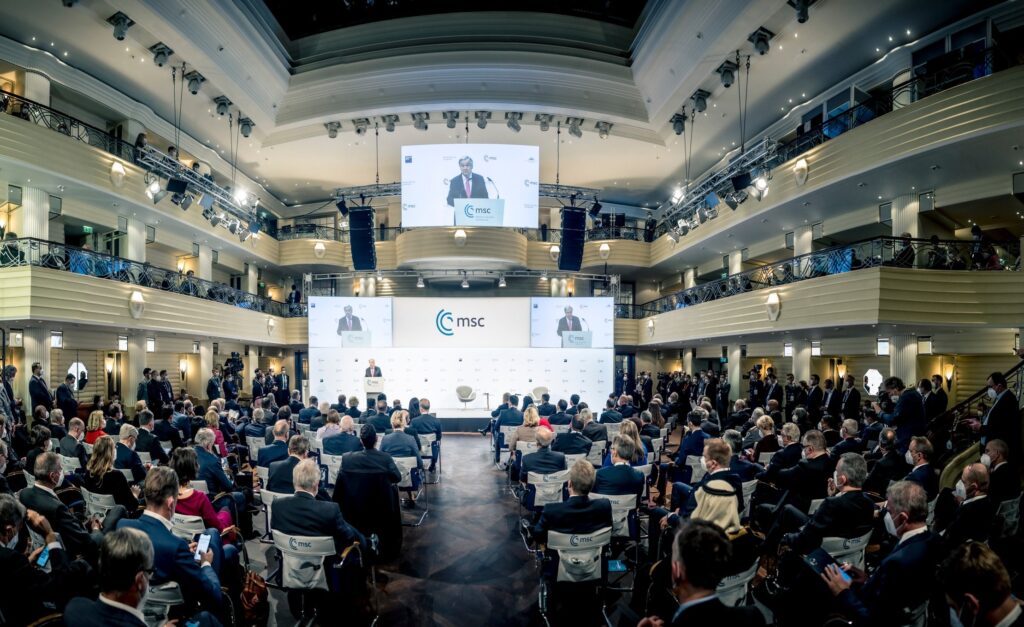
The annual 59th Munich Security Conference (MSC 2023) took place from 17 to 19 February 2023 in Munich, Germany. The conference, organised as an in-person event, focuses on global security policies, and brings together senior decision-makers from around the world, including heads of state, ministers, prominent figures from international and non-governmental organisations, as well as high-ranking representatives from industry, media, academia, and civil society, for an intensive debate on the present and future security challenges.
Munich Security Conference covers a wide range of security-related topics, including transatlantic and European issues, as well as emerging challenges for the international community. This year’s edition will have a particular focus on the following:
1) How to maintain adherence to rules-based international order in the wake of the Ukrainian war,
2) Looking beyond its transatlantic-related issues, emphasising diverse perspectives from the Global South,
3) It will allow the German Federal Government to present and discuss its new National Security Strategy
The war in Ukraine was obviously the focal point in Munich as Russia’s special operation approaches its first anniversary. Western nations can take pride in their surprisingly robust response to the invasion; Ukrainians can be even prouder of their extraordinary bravery and ability to absorb advanced Western military technology. But Ukraine’s chances of expelling Russia from every acre of occupied territory remain uncertain at best, while the price the war is exacting on combatants and the global economy is huge and growing.
There is no guarantee, of course, that inviting Russian President Vladimir Putin or Foreign Minister Sergei Lavrov to Munich would have helped bring about a cease-fire, let alone a more permanent settlement. Christoph Heusgen, the chairman of the Munich conference, was quoted recently as saying that “We don’t want the Munich Security Conference to serve as a podium for Russian propaganda.” But not having Russians there does not advance the cause of peace, either. Instead, it confirms Putin’s view that Russia must continue to pursue this murderous conflict because the “West” is totally against him.
The limelight of this year’s Munich security conference was the address of Ukrainian president Zelensky where he urged world leaders to speed up support for his country. Zelensky spoke at the opening of the Munich Security Conference, as Germany pushed allies to deliver crucial tanks ahead of the first anniversary of Russia’s invasion. Allies have delivered an array of weaponry to Ukraine since the outbreak of the war and promise more, but Kyiv fears crucial supplies will arrive too late to defeat a major new offensive. Zelensky also insisted that there was “no alternative” to Ukraine triumphing in its fight against President Vladimir Putin’s troops, and no choice but for Kyiv to eventually join the EU and NATO.
“We need to hurry up,” Zelensky told the start of the three-day gathering via video link. “We need speed — the speed of our agreements, speed of our delivery… speed of decisions to limit Russian potential”.There is no “alternative”, as people’s lives are on the line, he said. The key annual conference comes just days ahead of the 24 February anniversary of Moscow sending its forces into the country, unleashing war in Europe for the first time in decades.
‘Intensify support’
Speaking to the forum after Zelensky, French President Emmanuel Macron urged allies to “intensify our support” for Ukraine to aid its forces in launching a counter-offensive. While insisting he did not want to see a drawn-out war, he said France was ready for a “prolonged conflict”. Macron said now is not the right time for dialogue with Moscow.”We have a Russia which has chosen war, which has chosen to intensify the war, and which has chosen to go as far as committing war crimes and to attacking civilian infrastructures,” he said.
Chancellor Olaf Scholz meanwhile insisted that German support was “designed to last”, but took a veiled swipe at other allies over faltering efforts to deliver promised tanks to Ukraine. Facing desperate pleas from Kyiv, Berlin finally agreed in January to allow German-made Leopard tanks — widely used in Europe — to be sent to Ukraine. Berlin has vowed to send some of the most modern equipment from its military stocks but is struggling to persuade allies to do the same.
“Those who can send such battle tanks should really do so now,” Scholz told the conference, promising “intensively campaigning” to get allies to move on the issue. It is a reversal of fortunes for Scholz, who has faced accusations of foot-dragging over his reluctance to permit delivery of the tanks. Under German law, Berlin must give permission for other countries that use the tanks to re-export them. As the war approaches its year mark and western aid to Ukraine continues to rise, it would be interesting to see the impact of the Munich conference on the present complicated geopolitical world.
Aayush Pal is a freelance writer on contemporary geopolitical developments. The views expressed in his work are entirely his own.
